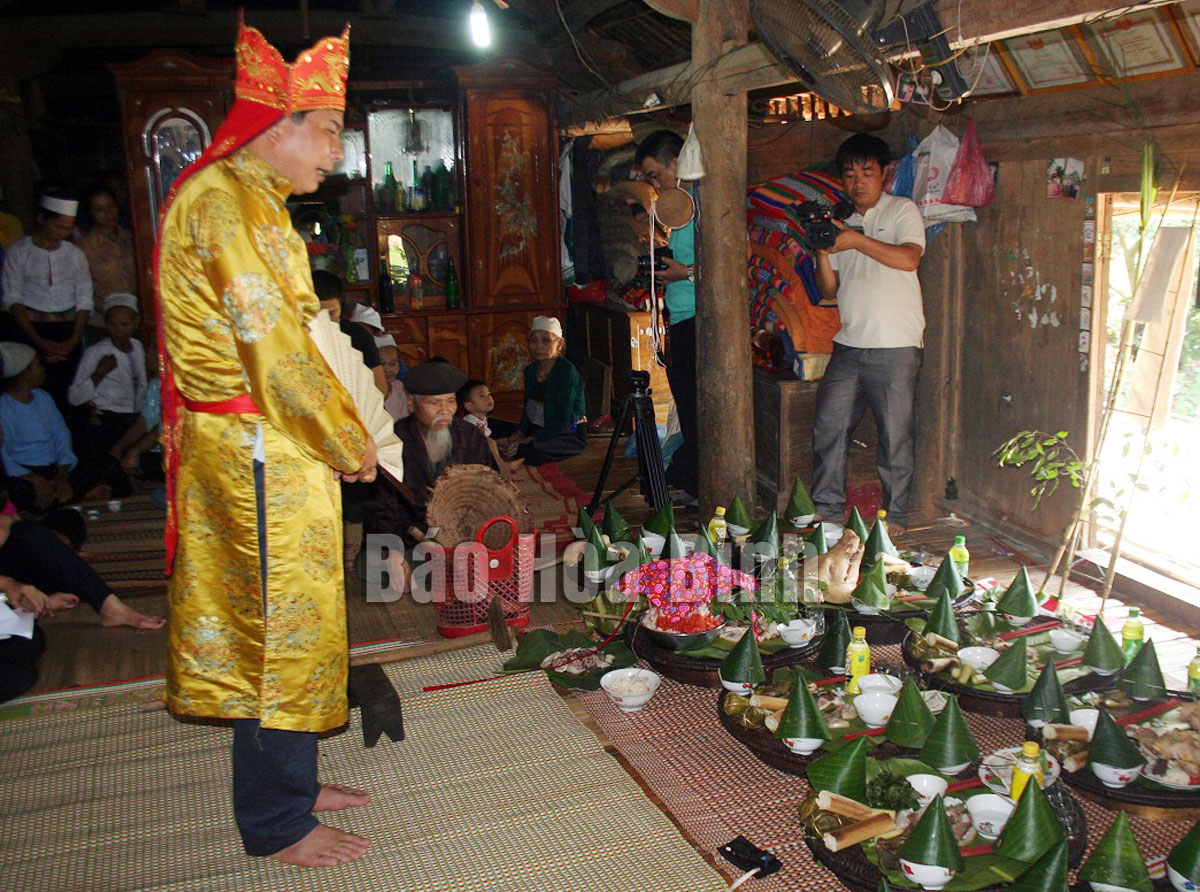
(HBO) - Mo Muong is a great creation of the ethnic Muong people. Mo Muong comprises most of the values that make up Muong culture namely history, literature, society, art and belief It is a cultural heritage that clearly reflects the Muong people’s outlook on life and the world that needs to be cherished and preserved for future generations. Some people said that Mo Muong is a folk encyclopedia about the Muong that has not been fully studied and thoroughly understood.
Meritorious Artist Bui Van Minh who
lives at Lac Son district’s Van Nghia commune at a ceremony to pray for good
health.
Mo Muong involves stories that reflect history, explain things
and phenomena in life as well as some beliefs and customs and languages of
Muong- Ancient Viet.
It also contains the Muong folk belief system, including worshiping customs namely
ancestor worship, trees of worship as well as buffalo and cow sacrifices.
Mo Muong, especially the epic one, reflects the life of the Muong people in the
early days and the later stages of the Muong's history through folklore
symbols.
There hasn’t been any thorough research on Mo Muong as well as the values it
leaves for the Muong people today and in the future although a study on it
began 100 years ago.
The value of folklore and education of Mo Muong is still intact in today's
life. It is an educational oral textbook that contributes to nurturing the soul
and personality of a simple life of the Muong people.
It is easy to recognize the historical value of Mo Muong as it helps the Muong
people know about the origin of the ancient Vietnamese Muong ethnic group.
Regarding cultural protection values, due to Mo Muong, it is difficult for
foreign religions to penetrate the Muong people despite living under French
colonial rule for almost 100 years. Once Mo Muong disappears, the Muong people
and its culture will lose the ability to defend against a foreign culture that
is harmful to them.
As time goes by, thanks to the attention of the Party and State, and the
participation of scientists, Mo Muong has been studied and revealed more human
values. It is hopedthat those values will be brought back to life to
contribute to the development of Hoa Binh province./.
Phong Phu commune, Tan Lac district of Hoa Binh province, is widely regarded as the cultural heartland of the Muong ethnic group. Among its many traditional communities, Luy Ai hamlet (formerly Ai hamlet) stands out as a rare location where the customs and way of life of the Muong Bi people remain largely intact.
The Truong Kha temple festival, a distinctive cultural event held every three years in Vu Ban township, Lac Son district, returned recently with vibrant rituals and folk traditions of the Muong people. Located next to the Buoi River in the Muong Trao fields, the Truong Kha Temple is dedicated to the three Kun Dol deities, revered for teaching farming techniques, irrigation, weaving, and protecting the harvest.
The demand for spaces serving community activities of residents in various areas across Hoa Binh city has been satisfied as local cultural houses now feature modern, spacious facilities thanks to the effective implementation of Resolution No. 49/NQ-HDND issued on December 28, 2021 by the city People's Council, which approved the plan for reorganising, converting, and allocating land for the construction, repair, and expansion of cultural houses in Hoa Binh’s villages and residential areas until 2025.
At the end of May, the Hoa Binh Provincial Ethnic Arts Troupe organized a series of performances for residents in Region 2 and Region 3 communes across the province. Bringing art to ethnic communities in remote, isolated, and especially disadvantaged areas has become a meaningful activity. These are not merely artistic performances but also journeys to disseminate cultural values, enrich spiritual life, and contribute to preserving the cultural identity of ethnic minorities.



